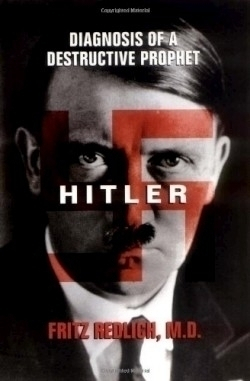
Hitler
Diagnosis of a Destructive Prophet
The eminent psychiatrist and neurologist Fritz Redlich, MD, formerly Chair of Psychiatry and Dean of Yale’s School of Medicine and currently Professor Emeritus of Psychiatry at UCLA, aimed to write a pathography of Adolph Hitler accessible to the general intelligent reader and, yet, speak to behavioral scientists, physicians (especially psychiatrists) and historians. A pathography is a study of how disease influenced the life and character of a person. That Redlich misfires does not surprise, for Adolph Hitler, the target of his postmortem, went to great lengths to insure that no one could take his measure on terms other than those which he, himself, would dictate. He took steps to obliterate his past, distance himself from human intimacy, and consistently confide in no one in his efforts to replace the man with a force of nature.
While he certainly did not write the pathography of his ambitions, Redlich did author a book which, nonetheless, does contribute to the “understanding Hitler” genre. Beyond providing in Part I a concise, even-handed description of what is known of Hitler’s life-span development, in Part II Redlich tells us what he believes can reasonably be assumed about Hitler’s physical health and personality and their influence on his behavior. This he does in journeyman fashion. Predictable, Redlich’s treatment of Hitler’s health is more objective and his treatment of Hitler’s personality more speculative. But regardless of whether Hitler has an autoimmune disease (Giant Cell Arteritis) or did or did not abuse amphetamines, whether he was a latent homosexual or had a congenital deformity of his genitalia (hypospadia) which he attributed to syphilis and, thereupon, set out to save the Germans from degeneration—physical and moral—what emerges from Redlich’s book is an image of Hitler as a brilliant autodidactic “possessed by his own bright, coherent dream,” “a lunatic’s violent and cunning vision, which distorted the facts too easily in his favor.”
Redlich’s book will clearly prove useful to those who wish to increase their knowledge of Hitler’s physical and psychological anomalies. I doubt that this book will increase one’s understanding of Hitler’s influence, however. The truly important explanation of why and how so many came to find “this evil man, this monstrous abortion of hatred and defeat” such an appealing leader is yet to be written.
Reviewed by
Herbert H. Krauss
Disclosure: This article is not an endorsement, but a review. The publisher of this book provided free copies of the book to have their book reviewed by a professional reviewer. No fee was paid by the publisher for this review. Foreword Reviews only recommends books that we love. Foreword Magazine, Inc. is disclosing this in accordance with the Federal Trade Commission’s 16 CFR, Part 255.
